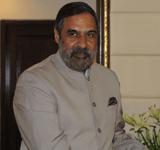
New Delhi, July 16: Asserting that policy decision is "sovereign" right of the country, Commerce and Industry Minister Anand Sharma today said the Barack Obama administration should itself lead the fight against protectionism and trade barriers.
In his reaction to the US President's remarks that India must carry out difficult economic reforms, Sharma said," "he (Obama) has every right to convey what his perceptions are but the policy making is a sovereign decision and India's FDI policy regime is investor-friendly".
Obamba in an interview to PTI noted that India prohibits foreign investment in too many sectors such as retail and endorsed another wave of economic reforms.
"It is still too hard to invest in India. In too many sectors, such as retail, India limits or prohibits the foreign investment...which is necessary for India to continue to grow," Obama has said.
Citing different reports, Sharma said India remains one of the attractive destinations for foreign direct investment as most of the sectors are open for FDI.
"...by all indications it is the regime, the climate that we have created in India through various policy measures, reforms, simplification, rationalisation. We have followed a calibrated approach in following the path of economic reforms," he told reporters here.
Besides, several Indian companies have made big investments abroad including in the US creating over half a million jobs in America at a time of job losses there.
"We would rather urge the US to demonstrate leadership in bringing down barriers, encouraging capital flows and trade in the world which is good for every economy. The US should be leading the fight against protectionism and taking forward the stalled Doha Development Round of the WTO to a meaningful conclusion," he added.
Indian industry and the government has been protesting against several protectionist measures in the US including hike in visa fee which has affected India's software companies like Infosys and TCS.
Sharma said when it comes to taking more decision,"the Prime Minister has said and I am also saying that we are committed to continue following our roadmap of economic reforms...we have an abiding commitment to reforms. We remain an attractive destination and we will continue to be".
However, the government takes decision after an "inclusive" process of consultations, he said.
"We have taken note of his (Obama) observations. There is always a difference between perception and reality," he said.
Economic Affairs Secretary in the Finance Ministry R Gopalan said the government, "in its wisdom will take appropriate decision at right time".
The government has been facing a criticism from a section of the industry and overseas investors for being slow in reforms, particularly with regard to allowing FDI in multi-brand retail. Facing opposition from its key ally, Trinamool Congress, it could not implement the Cabinet decision of November 2011 to allow 51 per cent FDI in multi-brand retail.
Sharma said that UNCTAD in its report has ranked India as the third important destination to attract FDI.
"JBIC (Japan Bank for International Cooperation) has also placed India at number two, and in the long term they have put India on number one. E&Y has said that over four-fifth of FDI in South Asia has come into India," he said.
He also said that Obama has paid rich tributes to India and its people.
"He (Obama) has talked about about Indian innovation being engine of the global economy. He has said that despite the global gloom, Indian economy has shown a very impressive growth," he said.
On a perception that India is not attracting FDI, he said: "last year we have received FDI in excess of USD 50 billion. Why this perception, I fail to understand...I think there is something wrong in perception, the facts speak otherwise".






Comments
Add new comment